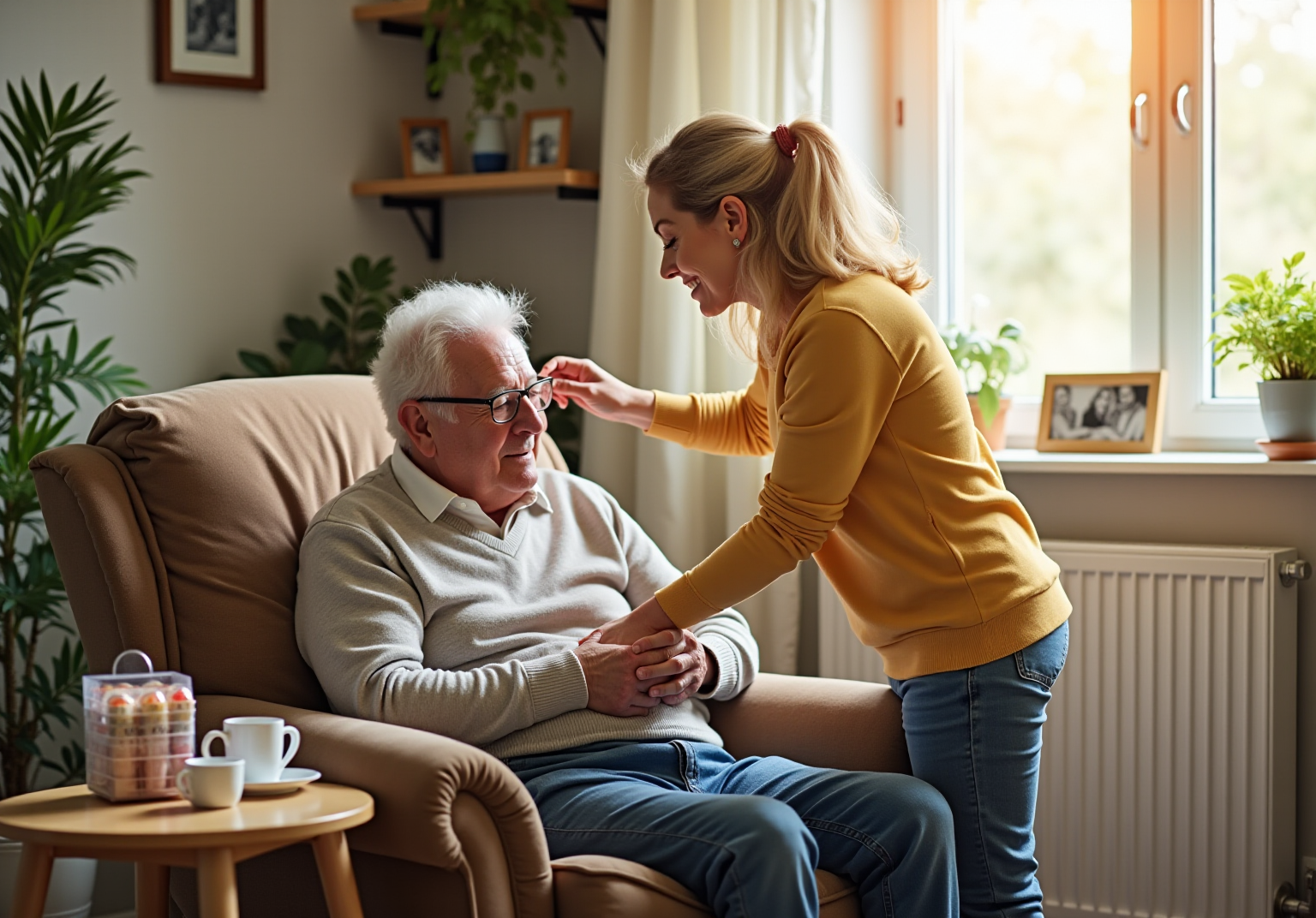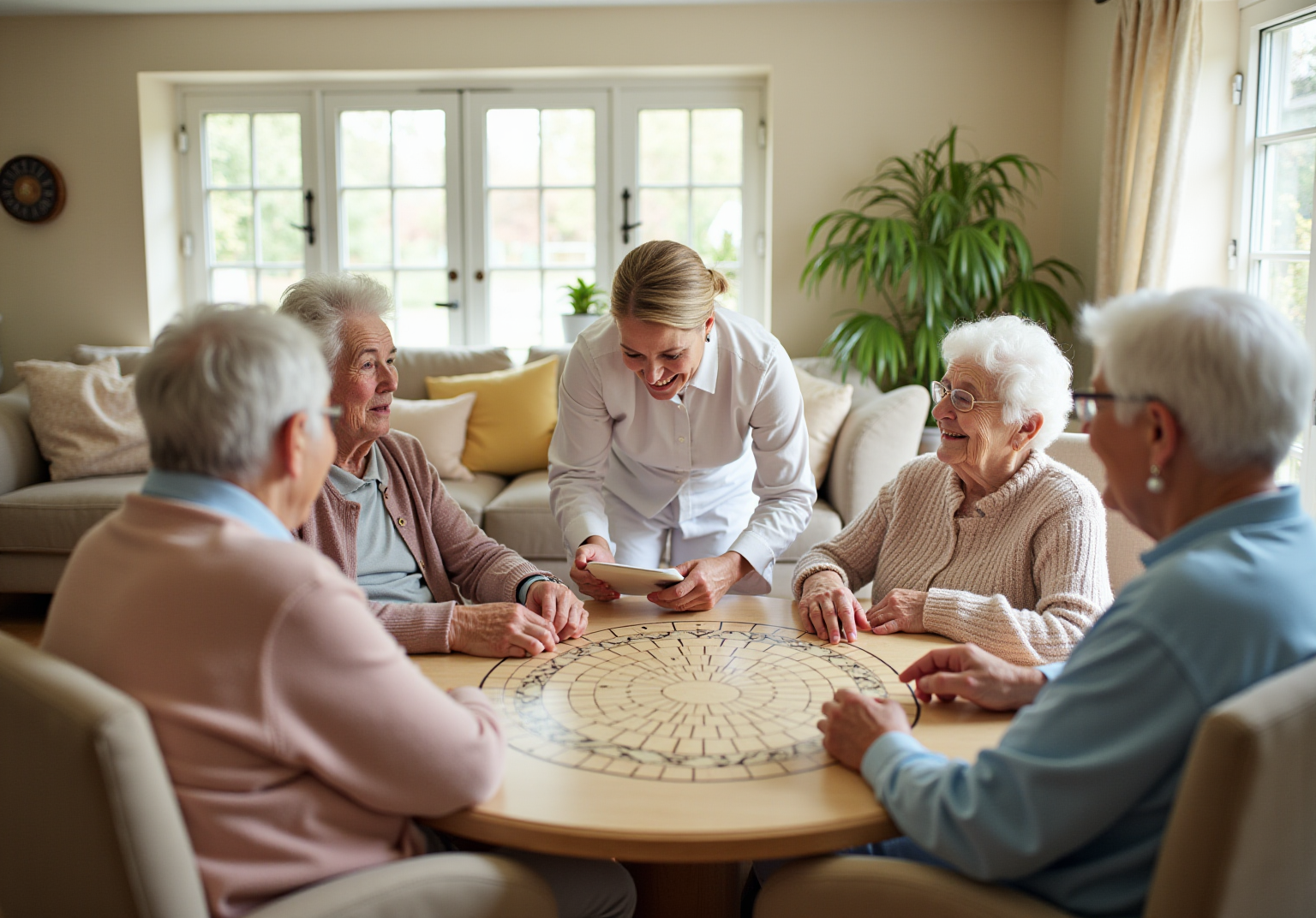Overview
Caring for seniors requires a unique set of essential skills that every new caregiver should master. These skills include:
- Effective communication
- Empathy
- Time management
- Basic medical knowledge
- Personal care skills
- Problem-solving
- Safety awareness
- Self-care
By developing these abilities, you not only enhance your relationship with elderly individuals but also improve their overall well-being.
Imagine the difference these skills can make in your caregiving journey. Mastering them is crucial for providing high-quality support to those in need. As you grow in these areas, you will find that you can better manage the emotional and practical challenges that come with caregiving.
In addition, these skills help you foster trust and understanding with your clients, which leads to improved patient outcomes. Your ability to connect on a personal level can transform the caregiving experience for both you and the seniors you support.
Remember, we’re here for you. Your comfort is our priority, and by embracing these essential skills, you can ensure that you provide the best care possible. Together, we can navigate the challenges of caregiving and create a nurturing environment for our beloved seniors.
Introduction
In a world where the demand for compassionate care is ever-increasing, the role of a caregiver stands out as both a profound responsibility and a rewarding vocation. Caregivers are the unsung heroes, providing essential support to individuals who may be elderly, disabled, or recovering from illness. Their duties extend far beyond basic assistance with daily tasks; they serve as emotional anchors, advocates, and companions who enrich the lives of those they support.
However, the journey of caregiving is not without its challenges. From managing the emotional toll to mastering vital skills, caregivers must navigate a complex landscape to ensure the well-being of their clients. In addition, it’s crucial to recognize the importance of self-care and effective communication in fostering positive caregiver-client relationships.
This article delves into the multifaceted nature of caregiving, offering insights and strategies to empower caregivers in their crucial roles. We’re here for you, ensuring that your comfort is our priority as we explore how to enhance the caregiving experience together.
Understand the Role of a Caregiver
The role of a caregiver in senior caregiving is multifaceted, encompassing a variety of responsibilities intended to assist individuals who may be elderly, disabled, or recovering from illness. Senior caregiving includes assisting with essential daily activities such as:
- Bathing
- Dressing
- Meal preparation
- Medication management
Beyond these practical tasks, senior caregiving provides vital emotional support, companionship, and advocacy for the needs of those they assist, which is crucial for maintaining quality of life.
Establishing trust and rapport with individuals is essential to fostering a positive caregiving relationship. This trust not only enhances the efficiency of support but also contributes to the emotional well-being of both the provider and the client. In fact, studies indicate that approximately 66% of individuals engaged in senior caregiving struggle to find adequate resources, highlighting the need for a supportive framework that can alleviate their burdens and improve care quality.
Senior caregiving also presents significant emotional challenges, as the responsibility of caring for others can take a toll on caregivers’ mental health. It is crucial for those who provide care to engage in self-care and create networks to sustain their well-being. For instance, a case study titled “Navigating the Challenges of Dementia Behaviors: Strategies for Respectful Care” highlights effective approaches for those assisting individuals with dementia-related behaviors, emphasizing the importance of respectful interactions that enhance outcomes for people with dementia.
Moreover, a significant portion of caregivers—about 20%—are family members or friends, which can complicate the emotional dynamics of caregiving. This reality underscores the necessity for those engaged in senior caregiving to balance their roles while ensuring they offer the emotional support that clients require. Without adequate senior caregiving services, elderly individuals face dangers such as:
- Health deterioration
- Inadequate nutrition
- Social isolation
Thereby increasing the importance of those providing assistance. By understanding these responsibilities and the emotional landscape of senior caregiving, individuals in this role can better navigate their positions and foster successful relationships with clients. Additionally, services like Private Duty RNs and LPNs offered by Best Care Nurses Registry can provide essential support in these scenarios.
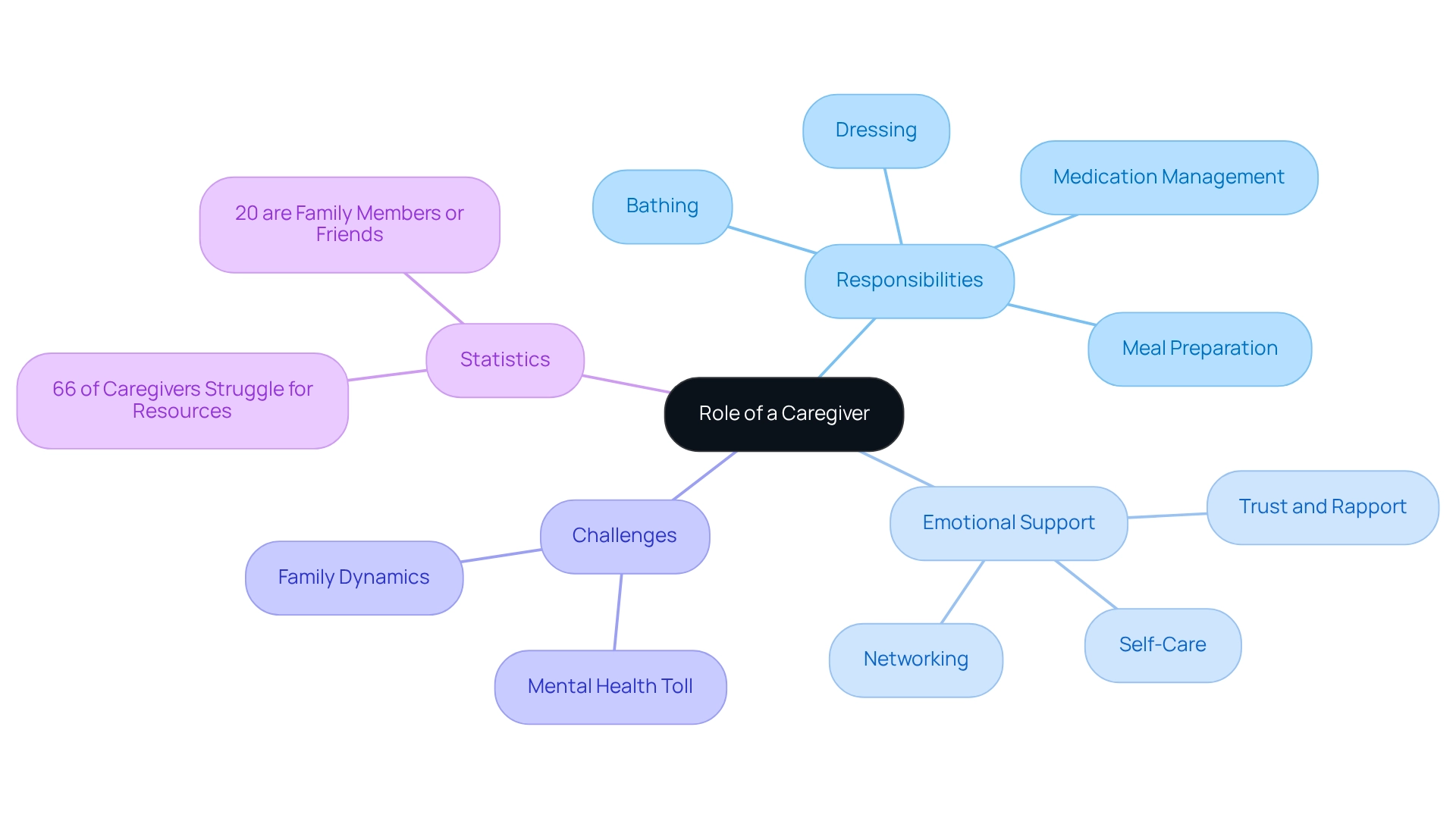
Master Essential Caregiving Skills and Techniques
To excel as a caregiver, mastering a set of essential skills and techniques is vital.
- Effective Communication: Clear communication is essential for understanding patient needs and conveying critical information to healthcare professionals. Caregivers should engage in active listening and articulate their thoughts clearly to foster collaboration and trust. Effective communication has been shown to enhance caregiver-client interactions, leading to improved patient outcomes and reduced hospital readmission rates, as highlighted in recent case studies, including the one titled “Home Care: A Key to Curbing Costly Hospital Returns.”
- Empathy: This allows providers to connect deeply with clients, enhancing emotional support and trust. Understanding the feelings and perspectives of those in their care leads to more personalized interactions. Acknowledging the humanity of those who provide care and celebrating their contributions is crucial for nurturing a supportive environment for caregiving.
- Time Management: Caregivers often juggle numerous responsibilities. Prioritizing tasks and managing time efficiently guarantees that all customer needs are handled swiftly, alleviating stress for both the provider and the customer.
- Basic Medical Knowledge: A solid understanding of common medical conditions, medications, and emergency procedures is essential. Caregivers should be skilled at monitoring vital signs and identifying signs of distress, significantly affecting patient safety and well-being. This knowledge is particularly important for those managing chronic conditions or recovering from surgeries, as highlighted in the guidelines for assessing the need for CNA/HHA caregiver services.
- Personal Care Skills: Assisting individuals with bathing, grooming, and dressing requires knowledge of proper techniques to maintain their dignity and comfort. This skill set is fundamental to providing high-quality personal care, which is a hallmark of the compassionate support that Best Care Nurses Registry is known for.
- Problem-Solving Skills: Caregivers must be resourceful and able to address unexpected challenges, whether they relate to health issues or logistical concerns. Effective problem-solving can lead to improved results for individuals and smoother caregiving experiences.
- Safety Awareness: Creating a safe environment is paramount. Caregivers should be trained in fall prevention, emergency response, and managing hazardous situations to protect their clients from harm. This training is essential for enabling seniors to live securely and joyfully at home, reducing the stress for family members who provide support.
- Self-Care: The demands of caregiving can be overwhelming, making it essential for those providing care to prioritize their own health and well-being. Seeking assistance and taking necessary breaks are essential for maintaining the energy and concentration required to deliver outstanding service.
Statistics show that almost 70% of family supporters dedicate their time for two to ten years, highlighting the significance of these skills in handling long-term caregiving duties. By developing these crucial abilities, providers can greatly influence the standard of senior caregiving offered to elderly individuals, ensuring that they obtain the empathetic and individualized help they merit. Moreover, Best Care Nurses Registry provides personalized support strategies and thoroughly vetted professionals to further assist family caregivers in their vital roles.
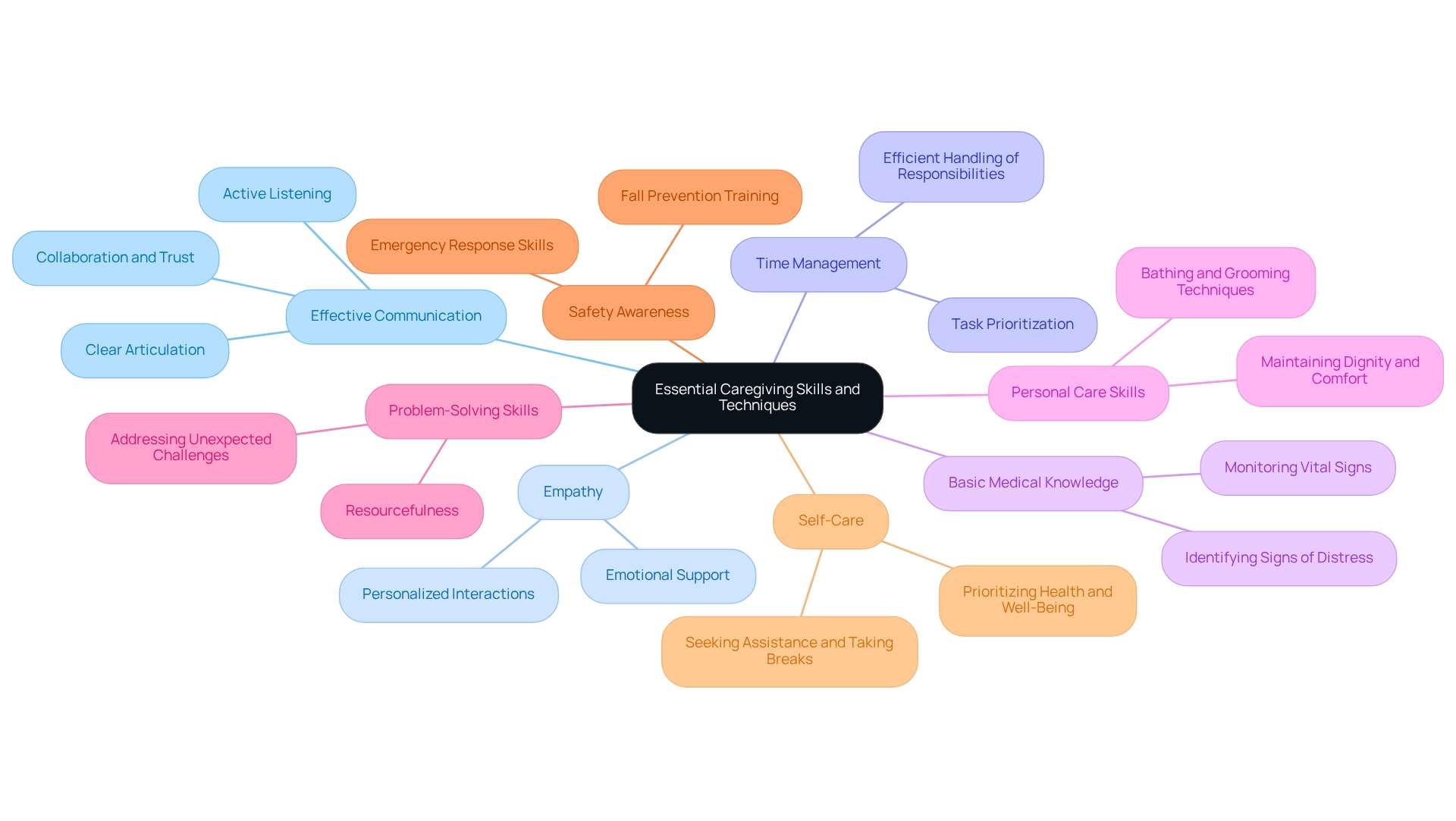
Develop Strong Communication Skills
Effective communication is a cornerstone of successful senior caregiving. As caregivers, it’s essential to focus on the following aspects to foster a nurturing environment:
-
Active Listening: Engaging in active listening is vital. By paying close attention to what clients express, those involved in senior caregiving show that their thoughts and feelings are valued. This practice not only promotes trust but also supports open dialogue, which is crucial for effective support. Attentive listening can help identify signs that suggest a need for home assistance, such as challenges with daily tasks or memory issues.
-
Non-Verbal Communication: Being aware of non-verbal cues—like body language, facial expressions, and tone of voice—is key. These signals convey empathy and understanding, significantly impacting the caregiver-client relationship. Research indicates that effective non-verbal communication enhances the overall senior caregiving experience, making it essential for caregivers to be attuned to these signals.
-
Clear Instructions: Providing clear and concise instructions is imperative, especially when discussing medication or daily routines. Clarity helps avoid confusion and ensures that individuals understand their treatment plan, promoting adherence and safety. In senior caregiving, caregivers should be prepared to clarify the support strategy established during the initial evaluation, ensuring that patients and their families are fully informed.
-
Encouraging Feedback: Actively inviting input from clients and their families is essential. This practice not only enhances the caregiving experience but also addresses any issues promptly, ensuring that support aligns with the individual’s needs and preferences. Understanding family concerns about finding a reliable support provider can also guide improvements in service delivery.
By refining these communication skills, caregivers involved in senior caregiving can significantly improve the quality of assistance they offer, ultimately leading to better outcomes for their clients. Remember, your comfort is our priority, and we’re here for you every step of the way.
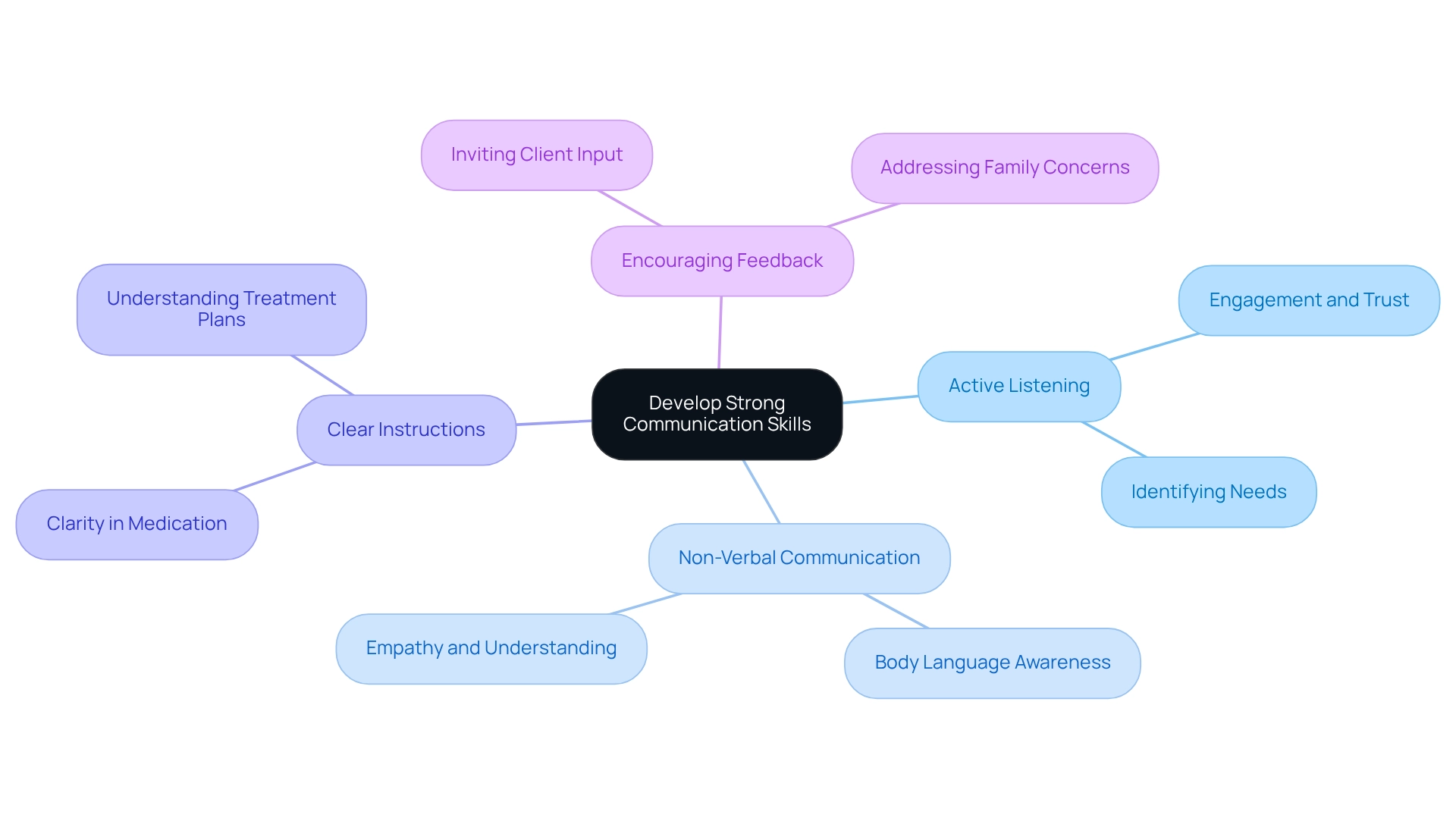
Practice Patience and Emotional Resilience
Patience and emotional resilience are essential qualities for caregivers. Here are some strategies to cultivate these important traits:
-
Engaging in mindfulness practices can be a powerful tool. Techniques such as meditation or deep breathing exercises help manage stress and maintain focus during challenging situations. Research suggests that regular mindfulness can enhance well-being and health outcomes for caregivers. As Cristina Fernández-Portero notes, “This study presents evidence of the impacts of mindfulness intervention programs with family supporters on their health and well-being.”
-
It’s also vital to set realistic expectations. Understand that progress may be slow, and setbacks can occur. By setting achievable goals for both yourself and your clients, you can help manage feelings of frustration and disappointment.
-
Seeking support from others can make a significant difference. Connecting with fellow caregivers or joining support groups allows for the sharing of experiences and coping strategies. This connection can provide both emotional relief and practical advice.
-
Additionally, reflecting on your daily caregiving experiences is crucial. Take time to identify what went well and what could be improved. This reflection fosters personal growth and resilience. A case study titled “Mindfulness Practices for Care Provider Well-Being” highlights the positive effects of mindfulness on health, reinforcing the significance of these practices. Furthermore, the reliability of the Zarit Caregiver Burden Interview was high, with scores of 0.909 at T1 and 0.907 at T2, indicating significant caregiver stress and the need for effective coping strategies.
Remember, you’re not alone in this journey. We’re here for you, and your comfort is our priority.
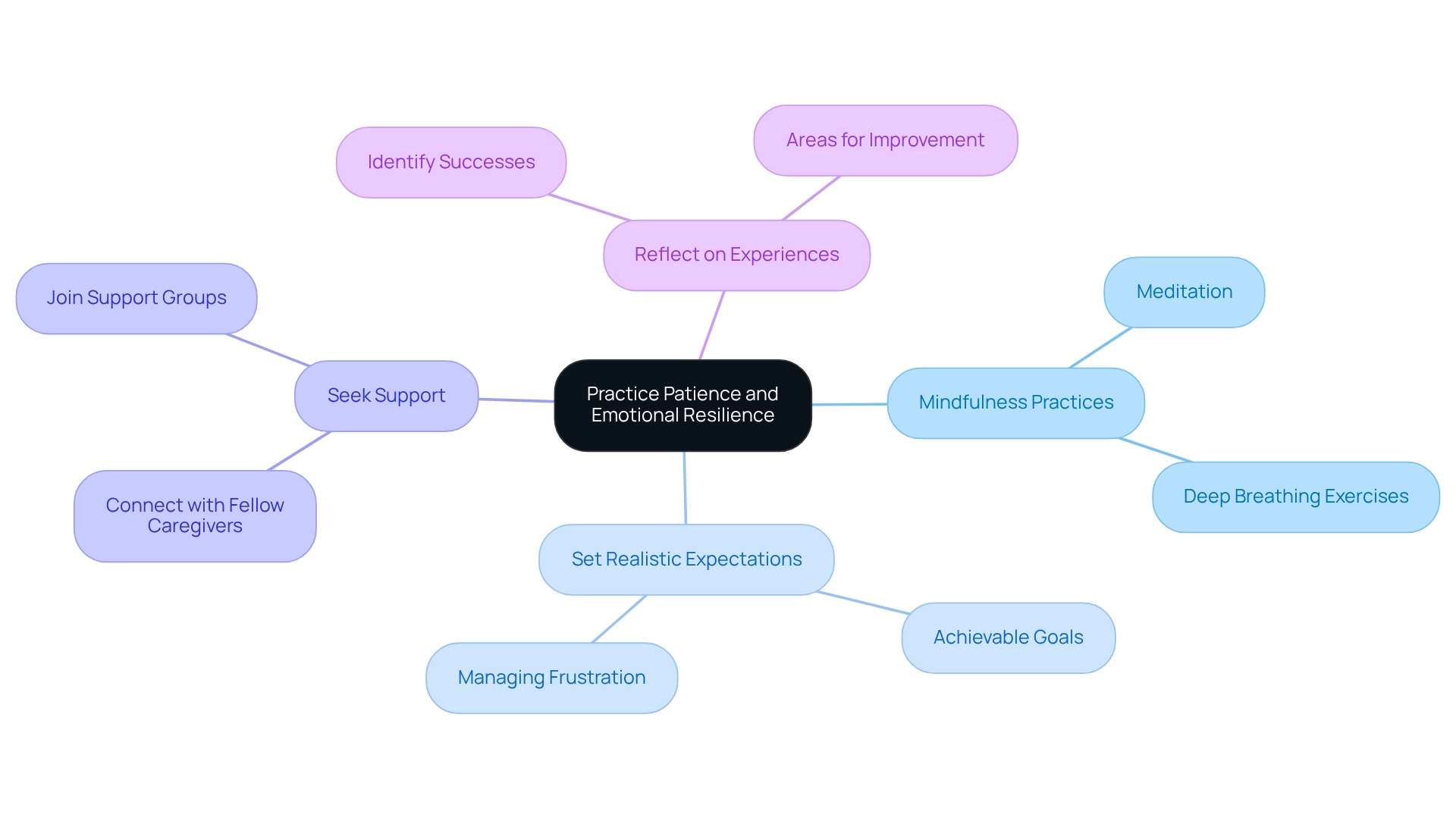
Conclusion
The caregiving journey is not just a profound responsibility; it is also a deeply rewarding experience that touches the heart. Caregivers play a crucial role in supporting individuals who are elderly, disabled, or recovering from illness, offering not only practical assistance but also emotional support and companionship. Acknowledging the multifaceted nature of this role is essential, as it encompasses various responsibilities that significantly impact the quality of life for clients.
Mastering essential caregiving skills—such as effective communication, empathy, time management, and safety awareness—enables caregivers to deliver high-quality, compassionate care. By honing these skills, caregivers can create a nurturing environment that fosters trust and enhances the caregiving experience. Furthermore, prioritizing self-care is vital for caregivers to sustain their well-being and maintain the energy necessary to provide exceptional support.
Ultimately, the challenges of caregiving can be met with resilience and patience. When caregivers actively seek support and practice mindfulness, they can navigate the emotional complexities of their roles while ensuring that their clients receive the best possible care. Reflecting on their experiences and setting realistic expectations allows caregivers to embrace their journey with confidence.
In a world where compassionate care is increasingly essential, empowering caregivers through education, support, and resources is crucial. By recognizing and addressing their needs, we can uplift these unsung heroes, allowing them to continue their invaluable work with confidence and compassion. Remember, we’re here for you, and your comfort is our priority.
Frequently Asked Questions
What are the primary responsibilities of a caregiver in senior caregiving?
The primary responsibilities of a caregiver in senior caregiving include assisting with essential daily activities such as bathing, dressing, meal preparation, and medication management.
How does senior caregiving contribute to emotional support?
Senior caregiving provides vital emotional support, companionship, and advocacy for the needs of those being assisted, which is crucial for maintaining their quality of life.
Why is establishing trust important in a caregiving relationship?
Establishing trust and rapport is essential as it enhances the efficiency of support and contributes to the emotional well-being of both the caregiver and the client.
What challenges do caregivers face in finding resources?
Approximately 66% of individuals engaged in senior caregiving struggle to find adequate resources, highlighting the need for a supportive framework to alleviate their burdens and improve care quality.
What emotional challenges do caregivers encounter?
Caregivers often experience significant emotional challenges, as the responsibility of caring for others can take a toll on their mental health. Engaging in self-care and creating support networks is crucial for sustaining their well-being.
What is a notable case study related to dementia caregiving?
The case study titled “Navigating the Challenges of Dementia Behaviors: Strategies for Respectful Care” highlights effective approaches for assisting individuals with dementia-related behaviors, emphasizing the importance of respectful interactions.
How many caregivers are family members or friends, and what implications does this have?
About 20% of caregivers are family members or friends, which can complicate the emotional dynamics of caregiving, necessitating a balance between their caregiving roles and providing emotional support.
What risks do elderly individuals face without adequate caregiving services?
Without adequate senior caregiving services, elderly individuals face risks such as health deterioration, inadequate nutrition, and social isolation.
How can caregivers enhance their effectiveness in their roles?
By understanding their responsibilities and the emotional landscape of senior caregiving, individuals in this role can better navigate their positions and foster successful relationships with clients.
What additional services can support caregivers and clients?
Services like Private Duty RNs and LPNs offered by Best Care Nurses Registry can provide essential support for caregivers and clients in senior caregiving scenarios.

